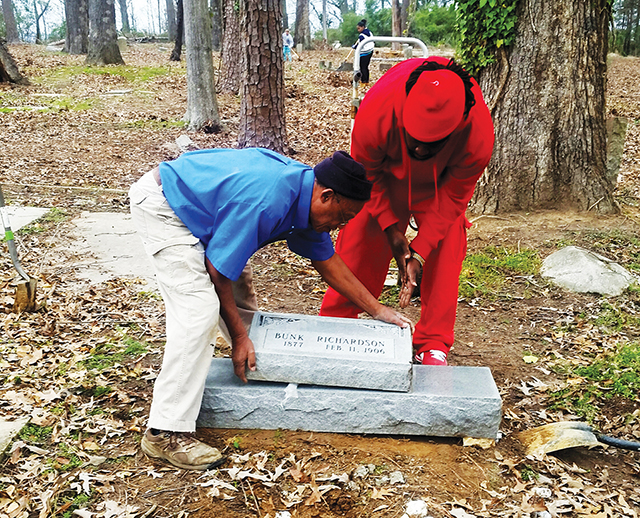By Sarrah Peters, News Editor
On Monday, July 10, Grace Heritage Community Development Executive Director Chari Bostick spoke at the Gadsden Public Library about the foundation’s efforts to preserve, document and repair Southern Hill Cemetery.
Southern Hill Cemetery, also known as the Sixth Street Cemetery, was a cemetery for Etowah County’s African American community that was in use from 1849 to 1972. The cemetery started as a burial site for slaves. It went on to be used by the black community, because in the past cemeteries were segragated. Throughout the years, the cemetery grew to be 8.4 acres.
Bostick started the Grace Heritage Community Development in 2013, but she has been working on the cemetery revitalization project since 2011. There were efforts to clear and maintain the cemetery prior to Bostick, but the group had stopped working on it several years before Bostick began her efforts.
“I took it on as a project because I have family that is buried in this cemetery that I have not found to this day,” said Bostick.
The cemetery has fallen into disrepair for several reasons. The cemetery has been subject to vandalism and has been damaged by building projects. Vandalism has included breaking headstones, stealing iron and even stealing headstones to place in a yard as a Halloween prank. One of the buildings of the Williamsburg Apartment Complex was erected on top of a portion of the cemetery. Headstones and bones removed from the area to build were dumped into a mass grave, which resembles a mound now. Archeologists have advised the foundation not to disturb the mound, so it will be covered and made into a memorial at a later date. The James D. Martin Walking Trail also cuts through a small portion of the cemetery.
To protect the cemetery from further encroachment, Bostick’s first order of business was to place the cemetery on the State of Alabama’s Historic Registry. The Grace Heritage Foundation now owns the property, which was recently marked with a historical sign. Fences have been erected to protect the cemetery from vandalism. Plans are in place to erect more fencing in the future. Roads were cleared to provide access to the entire cemetery.
The abandoned cemetery had no maintenance for quite some time. The cemetery has become overgrown. In summer, kudzu takes over the property. Graves were eroded and sank in. Headstones also sank into the earth, often falling into the grave itself. These eroded graves must be filled in, with headstones lifted and placed back in place when possible.
The African American community used burying practices that utilized what was on hand, including wooden box caskets; handlaid brick vaults topped with wood then a slab of rock or concrete; and stacked burials with two tenants in each grave. Some of these practices can cause graves to sink in after the wood deteriorates. Plots were also placed very close together. Unmarked graves were not uncommon.
“Most earlier black cemeteries were not marked at all,” said Bostick. “They did not really adopt common burial practices until well after the 1920s.”
During slavery, burials were often held at night because they were forced to work during the day. Graves were left unmarked so that slaveowners did not know where they were buried. Instead, flowers were planted on the grave to mark.
“Now that we are raking the leaves back, those plants are growing back,” said Bostick.
These plants are protected, although some pine trees have been cleared. Bostick said that the foundation is very careful to try to do as little damage as possible.
In addition to repairing the graves, the cemetery project also takes pictures of each headstone to catalogue them. The foundation attempts to find documentation, such as death certificates, for each headstone. This is not as easy as it sounds, as many buried in the cemetery had no documentation. Many graves are unmarked or marked with too little information to identify them.
“The state of Alabama did not consider African Americans people and actually document them until 1906,” said Bostick. “So there were not death certificates for every black person that passed away.”
Some have only coffin receipts to document their existence. So far about 820 graves have been documented.
The cemetery offers history. There are headstones from death and burial insurance companies, which was sold seperately to the black community.
“You could not purchase burial insurance from a white company, so they set up their own,” said Bostick.
Several notable members of the African American community were buried in this cemetery including Lucinda Murphy, a founding member of the Holy Comforter Episcopal Church; Thomas Rhymes, the first African American mortician in Gadsden who actually worked at Sixth Street Cemetery; and Bunk Richardson, who was unjustly lynched in Gadsden in 1906. Richardson was questioned about the rape of a white woman, but was cleared by the police department. He was buried in an unmarked grave to protect against vandalism. A headstone was recently placed on his grave, located with the help of Jack Lowe, Sr. There are many military headstones in the cemetery, from as far back as the Civil War. Every catalogued military headstone has been replaced by the United States military, regardless of the condition of the headstones. So far, 32 headstones have been delivered to Sixth Street Cemetery.
A work day will be held tomorrow on Saturday, July 15. Volunteers are encouraged to come help clean up. Long sleeves and pants should be worn. Volunteers are encouraged to bring tools for clearing brush, although some will also be on hand for use.
The Sixth Street Cemetery operates with funds from grants and donations. The Annual Soul Gala, the foundation’s main fundraiser, will be held at the Gadsden Museum of Art on September 8 at 6 p.m. Tickets will go on sale on August 1.
To donate or volunteer, call 256-441-2789 or visit the Grace Heritage Foundation Facebook page.





